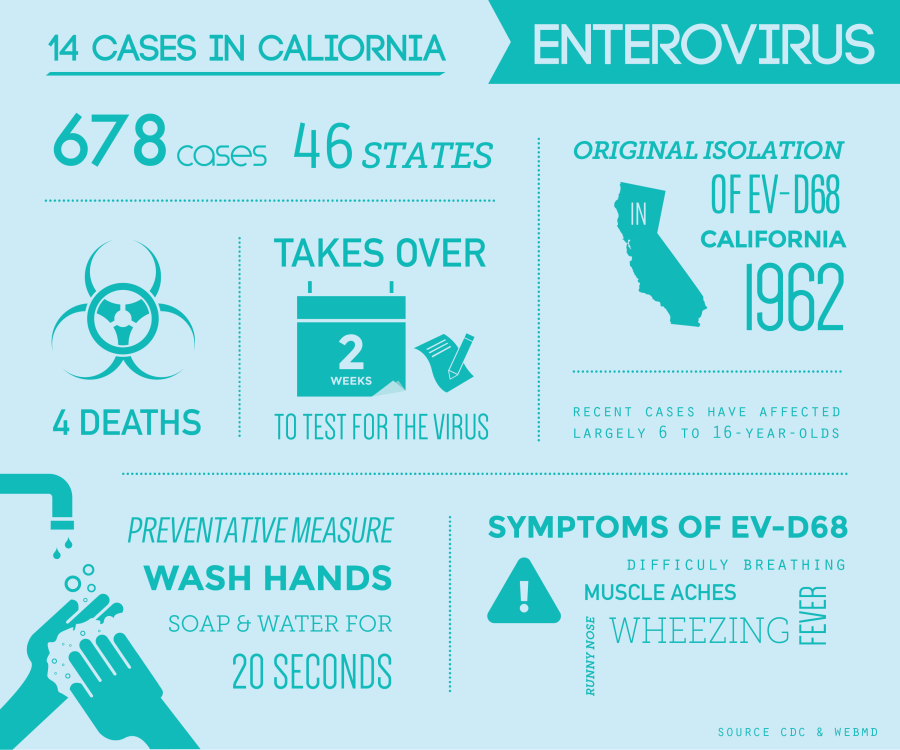Enterovirus spreads across country
46 states now affected by respiratory disease targeting school-age children with asthma
The Center of Disease Control and Prevention (CDC) has verified 500 cases of the child-specific Enterovirus D-68 in 42 states, including California, in the country as of Oct. 1.
Enterovirus D-68 is a respiratory disease that usually infects children who have asthma. It is a mutation of a common cold, and may cause the host difficulty in breathing. If this is the case, the host is then brought to the hospital and assisted with a respirator.
Mild symptoms of the virus include fevers, runny nose, sneezing, coughing, body and muscle aches, wheezing, and difficulty breathing, according to the CDC. In serious cases, the victim can be paralyzed.
“On October 2, two cases of E-D68 [were] verified in Alameda County,” Nott said. “Since it takes a little over 2 weeks to run the test to verify the virus, I think we can expect to see more cases in the future.”
According to KTVU San Francisco News, five cases of enterovirus D-68 have been detected in the Bay Area, four of which involve children.
This type of enterovirus was discovered in 1962 in California, but since then, the outbreak now is the first time it has spread all over the country. The first infections found in California were three children from San Diego. In Los Angeles, a child who was diagnosed with the enterovirus D-68 had partial paralysis due to the infection.
“There are now confirmed cases of young patients dying from this virus as well,” said Upper School biology teacher Dr. Gary Blickenstaff.
This virus mainly affects children ranging from toddlers to young teenagers.
“It is all the more concerning because it affects children almost exclusively,” said Debra Nott, the Director of Nursing, in an email interview. “This would indicate the adult population has already had this virus at some point and has maintained immunity to it.”
Unlike some other viruses, enterovirus D-68 has no vaccines. Dr. Blickenstaff suggested some ways for students to avoid coming into contact with this virus.
“Wash hands often with soap and water for 20 seconds,” he said. “Disinfect frequently touched surfaces, such as toys and doorknobs, especially if someone is sick.”
Mrs. Nott recommends that students be aware of their surroundings if they begin to notice symptoms of this virus.
“One more important component is to consider your Harker community and stay home when you are contagious,” she said. “No matter how important you think your upcoming test may be, it’s not worth making several of your classmates sick by coming to school when you have a fever.”
Enterovirus D-68 is continuing to spread throughout the state of California and the Bay Area, and as of now, there are no vaccines to protect children from this virus.
This piece was originally published in the pages of The Winged Post on October 17, 2014.

Trisha Dwivedi (12) is the Managing Editor of Harker Aquila. She was a reporter her freshman year, Business Manager of the Winged Post her sophomore year...

Jackie Gao (10) is in her second year on staff is a reporter of the Winged Post. Her favorite part of journalism is the ability to interact with various...


















![“[Building nerf blasters] became this outlet of creativity for me that hasn't been matched by anything else. The process [of] making a build complete to your desire is such a painstakingly difficult process, but I've had to learn from [the skills needed from] soldering to proper painting. There's so many different options for everything, if you think about it, it exists. The best part is [that] if it doesn't exist, you can build it yourself," Ishaan Parate said.](https://harkeraquila.com/wp-content/uploads/2022/08/DSC_8149-900x604.jpg)




![“When I came into high school, I was ready to be a follower. But DECA was a game changer for me. It helped me overcome my fear of public speaking, and it's played such a major role in who I've become today. To be able to successfully lead a chapter of 150 students, an officer team and be one of the upperclassmen I once really admired is something I'm [really] proud of,” Anvitha Tummala ('21) said.](https://harkeraquila.com/wp-content/uploads/2021/07/Screen-Shot-2021-07-25-at-9.50.05-AM-900x594.png)







![“I think getting up in the morning and having a sense of purpose [is exciting]. I think without a certain amount of drive, life is kind of obsolete and mundane, and I think having that every single day is what makes each day unique and kind of makes life exciting,” Neymika Jain (12) said.](https://harkeraquila.com/wp-content/uploads/2017/06/Screen-Shot-2017-06-03-at-4.54.16-PM.png)








![“My slogan is ‘slow feet, don’t eat, and I’m hungry.’ You need to run fast to get where you are–you aren't going to get those championships if you aren't fast,” Angel Cervantes (12) said. “I want to do well in school on my tests and in track and win championships for my team. I live by that, [and] I can do that anywhere: in the classroom or on the field.”](https://harkeraquila.com/wp-content/uploads/2018/06/DSC5146-900x601.jpg)
![“[Volleyball has] taught me how to fall correctly, and another thing it taught is that you don’t have to be the best at something to be good at it. If you just hit the ball in a smart way, then it still scores points and you’re good at it. You could be a background player and still make a much bigger impact on the team than you would think,” Anya Gert (’20) said.](https://harkeraquila.com/wp-content/uploads/2020/06/AnnaGert_JinTuan_HoHPhotoEdited-600x900.jpeg)

![“I'm not nearly there yet, but [my confidence has] definitely been getting better since I was pretty shy and timid coming into Harker my freshman year. I know that there's a lot of people that are really confident in what they do, and I really admire them. Everyone's so driven and that has really pushed me to kind of try to find my own place in high school and be more confident,” Alyssa Huang (’20) said.](https://harkeraquila.com/wp-content/uploads/2020/06/AlyssaHuang_EmilyChen_HoHPhoto-900x749.jpeg)



